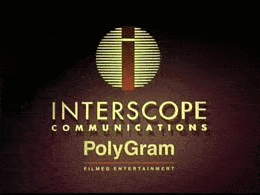Interscope Communications
 |
|
| Industry | Film studio |
|---|---|
| Fate | Shut down |
| Founded | 1982 |
| Defunct | 2003 |
|
Key people
|
Ted Field Robert W. Cort Scott Kroopf |
| Owner | Independent (1982–1994) Philips (1994–1998) Seagram (1998–1999) USA Networks (1999–2001) Vivendi (2001–2003) |
| Parent | Independent (1982–1994) PolyGram (1994–1998) Universal Studios (1998–1999, 2001–2003) USA Films (1999–2001) |
| Subsidiaries | Interscope Records |
Interscope Communications (also known as Interscope Pictures) was a motion picture production company founded in 1982 by Ted Field. Its divisions included Interscope Records (which was founded in 1990 as a joint venture with Atlantic Records).
Interscope Communications was founded in 1982 by media mogul Ted Field, who aimed to create films with mass appeal. Field acted as a producer or executive producer on a number of films in Interscope's filmography. The company’s first film, Revenge of the Nerds, was released in 1984 and was a box office success. That same year, Robert W. Cort, a former executive of 20th Century Fox and Columbia Pictures, joined Interscope and became the president of the company. Cort also co-produced a number of films.
In 1990, Nomura Babcock & Brown (NBB) invested $250 million in a joint venture with The Walt Disney Company and Interscope Communications. The deal called for NBB to co-produce and finance films for Interscope and Disney for four years. The joint venture produced five films between 1992 and 1995, all of which were marketed and released under two of Disney's production banners, Touchstone Pictures and Hollywood Pictures. The most successful film co-produced by Interscope and NBB was The Hand That Rocks the Cradle (1992), while other films produced by the joint venture were critical and commercial failures.
In 1992, PolyGram bought a controlling interest in Interscope Communications' film unit. Production and marketing budgets were to be paid by Polygram. Robert W. Cort, president of Interscope, left the company at the end of 1995 believing that PolyGram "took on much more of a corporate environment than it had before and that consequently his role had become more like an executive's than a producer's." Field purchased Cort's 12% stake in the corporation.
...
Wikipedia
